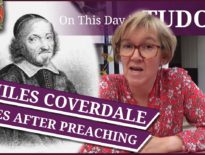On the night of this day in Tudor history, 21st January 1543, Henry Howard, Earl of Surrey, Thomas Wyatt the Younger and several other youths went on a five-hour rampage in London.
Surrey regretted his actions, calling that night "a madding time", but the king and the privy council took it seriously.
Find out what happened to Surrey and his fellow vandals in today's talk.
Also on this day in history, 21st January 1542, a bill of attainder against Queen Catherine Howard and one of her ladies, Jane Boleyn, Lady Rochford, was introduced into the House of Lords. Find out more in last year's video:
Also on this day in history:
- 1510 – Henry VIII opened the first Parliament of his reign.
- 1556 – Death of Eustace Chapuys, Imperial Ambassador at the English court from 1529-1545, at Louvain. He was laid to rest in the Chapel of Louvain College, the college he had founded.
- 1571 – Death of Walter Haddon, civil lawyer, reformer, MP and college head, in London. He was buried at Christ Church Greyfriars. As well as his work in colleges, Haddon is known for his polemical exchange with Portuguese priest Jerome Osorio da Fonseca who, in 1563, published an epistle calling for Elizabeth I to return to Catholicism, and Haddon was ordered by the government to reply.
- 1608 – Death of Sir Richard Lowther, soldier and landowner, at Lowther Hall. He was buried at the church in Lowther. His offices included Sheriff of Cumberland and Lord Warden of the West March.
Transcript:
On the night of this day in Tudor history, 21st January 1543, there was trouble in the city of London.
A group of half a dozen young men, including ringleader Henry Howard, Earl of Surrey (the famous, Tudor poet, courtier and soldier), and future rebel Thomas Wyatt the Younger (son of the poet Thomas Wyatt) went on a five hour rampage smashing windows, shooting prostitutes using stonebows, and shouting obscenities.
The trouble lasted until 2am. The next day, a rather repentant Surrey commented to his friend, George Blagge, that he was very sorry for his actions and wished “it were undone”, but that “we will have a madding time in our youth.”
Surrey may have seen it simply as “a madding time”, but the King’s Privy Council took the violence seriously and witnesses were examined. It was taken particularly seriously because the gang of men went on to break the Lenten fast, obtaining meat from an evangelical butcher. Surrey was called before a meeting of the Privy Council on 1st April 1543. Here is a record of that meeting:
“Meeting at St. James’s, 1 April. Present : Chancellor, Russell, Hertford, Winchester, Westminster, St. John, Gage, Browne, Wingfield, Wriothesley. Business :—The earl of Surrey being charged with eating flesh and breaking windows at night with stonebows, alleged his licence for the first, and as to the stonebows admitted that he “had very evil done therein.” He was committed to the Fleet. Thos. Wiatt and young Pickering charged with the same offences, alleged their licence for the first and denied the other. Wiatt was sent to the Counter and Pickering to the Porter’s lodge.”
Young Pickering is the William Pickering I talked about on 4th January.
Surrey’s poem “A Satire against the Citizens of London” is said to have been written while he was in Fleet Prison and is about the rampage he led. It starts:
“LONDON! hast thou accused me
Of breach of laws? the root of strife!
Within whose breast did boil to see,
So fervent hot, thy dissolute life;
That even the hate of sins, that grow
Within thy wicked walls so rife...”
and I’ll give you a link to read the rest - https://www.bartleby.com/256/44.html
Surrey was soon out of prison and fighting for Henry VIII in Flanders. Although, as you know, he came to a sticky end, being executed in January 1547 after being accused of improper heraldry and treason. Poor man. Here's the video I did on his execution:
January 4 - A rebel keeps his head – Talk on William Pickering



Leave a Reply